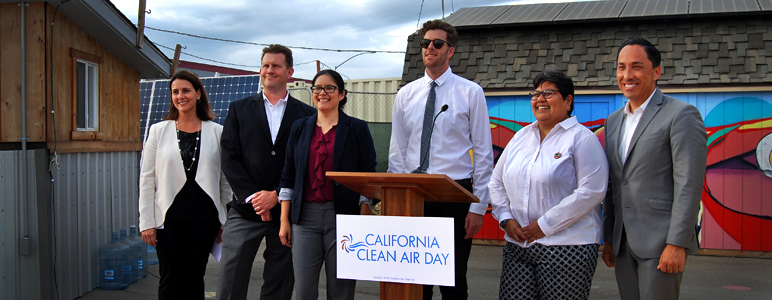


Poor air quality affects us all, but is especially harmful to seniors, children and those with respiratory illnesses who are the most vulnerable. It’s important for San Diego residents and businesses to recognize this situation and work to lessen local air pollution, which is mainly a byproduct of the transportation sector.
More than a dozen community organizations, businesses and elected leaders gathered to show support for clean air efforts on Wednesday, October 3, during the inaugural California Clean Air Day at Fair@44 in City Heights. San Diego was one of many cities that organized a regional event to highlight air quality impacts and encourage collective actions to reduce air pollution.
Local air quality decreases
A primary driver for poor air quality are vehicle emissions. According to the California Air Resources Board, the transportation sector accounts for about 41 percent of the state’s greenhouse gas emissions. That percentage is even higher in the City of San Diego–54 percent.
San Diego is well-known for its beautiful beaches and great quality of life, but what most don’t realize is that the region’s air pollution has been getting worse over the past few years. Data from CSE’s Equinox Quality of Life Dashboard indicate the number of unhealthy air days in San Diego increased 48% from 2016 to 2017.
Helping to clear the air
Thankfully, many individuals, organizations and businesses are supporting initiatives in the region that are helping to clean our air.
For example, the Metropolitan Transit System will acquire electric buses as part of a trial program. Last month, they also introduced its South Bay Rapid service, a nonstop commuting option to downtown that provides more residents the opportunity to take a direct bus trip instead of getting behind the wheel and searching for parking. Every effort to reduce polluting car trips leads to cleaner air and helps achieve local climate action plans.
“Improving mobility options, including public transportation, is an opportunity to improve the health of San Diegans and our quality of life,” said Councilmember Georgette Gómez, who also serves as chair of the MTS. “Transit builds communities and connects us together.”
Driving electric reduces auto pollution
There also are incentives for consumers and businesses purchasing electric vehicles and chargers in the region. The state’s Clean Vehicle Rebate Project offers Rebate Now, a pilot program in San Diego County that allows residents to be preapproved for an electric vehicle rebate before purchasing or leasing an eligible vehicle.
For charging an EV, San Diego Gas & Electric's Power Your Drive program provides low-cost charging stations for apartments, condominiums and workplaces. For sites located in a disadvantaged community, an applicant may be eligible for an EV charger at no cost for installation of maintenance. SDG&E also offers a time-of-use electricity rate so that customers can charge at home during the cheapest times of service—before 4 p.m. and after 9 p.m.
Estela de Llanos, SDG&E’s vice president of operations, sustainability and chief environmental officer, said in a statement, “We are proud to support Clean Air Day and do our part to improve local air quality. . . . Along with our industry-leading 45 percent renewable energy portfolio, we are building new charging stations to add more EVs to roadways which will help reduce harmful emissions.”
Thanks to the organizers
San Diego California Clean Air Day event organizers deserve special recognition for uniting people to improve our community health. Thanks go to San Diego Councilmembers Georgette Gómez and Chris Ward, Assemblymembers Todd Gloria and Lorena Gonzalez Fletcher, Center for Sustainable Energy, San Diego Gas & Electric, The Greenlining Institute and Coalition for Clean Air.
Learn more about California Clean Air Day and take the pledge at CleanAirDay.org.
